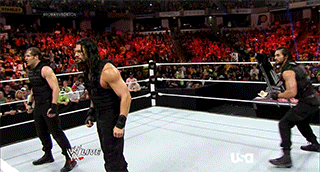Wrestling fans are unique in many ways. There isn’t an obvious wrestling fan demographic; some would argue that it seems to be men aged 16-25. But in reality the biggest wrestling company in the world WWE has an incredibly diverse audience with 62% of the US audience holding a college education and 34% of the worldwide audience being women. Wrestling isn’t an insular group, but the terminology of the sport can keep others from understanding storylines, characters or the entire sport as a whole.
So whether you’re just getting started with wrestling or you’re a life long fan who wants to brush up on their history – here is a beginners guide to wrestling terminology.
Wrestling for Beginners – The Basics
Angle
A fictional wrestling storyline. Typically an angle involves revenge or some kind of vendetta against another wrestler culminating in a match or a series of matches.
Babyface
The good guy but not a typical face. Before the rise of Stone Cold Steve Austin or Sting a babyface referred to any good guy, nowadays it means someone who displays very obvious good guy qualities.
Botch
A wrestling move or a scripted line that is screwed up. Check out beloved wrestling website Botchamania for some classic examples.

Buried
If a booker or upper management decide to ruin a wrestlers status because of a misdeed on their part they will ‘bury’ him/her by booking them to loose matches or giving them a humiliating gimmick. Thereby loosing them fans and respect.

Bump
When a wrestler falls onto the ring/ground from a move, they are ‘taking a bump’.

Cheap heat/cheap pop
Getting a positive reaction from the crowd by mocking/praising the town or a popular local sports team.
Face
The guy you are supposed to cheer for. Face’s can have no common qualities but they display general good guy or relatable qualities to the fans.
Finish
The end of the match. The match can finish ‘clean’ which means no outside interference or odd stipulations that takes the victory away from the winner.
Gassed out/blown up
When a wrestler is exhausted during a match and relies on resting moves in order to catch their breath.

Gimmick
The character portrayed by the wrestler. A gimmick can be subtle or it can be over-the-top and in your face depending on the nature of the gimmick.
Heat
When a wrestler gets a bad reaction from the crowd, when someone is booked as bad guy this is positive, when someone is supposed to be a face it can effect the direction of the character.

Heel
The villain, the audience is supposed to hate the heel. Faces and heels are booked against each other, although heels can face other heels on some occasions.

Job/Jobbing/Jobber
If you are a wrestler and ‘job’ to another wrestler, it means you are loosing the match to make the wrestler you’re facing look good. A jobber refers to a wrestler who does this often.
Mark
Someone who loves professional wrestling and is commonly thought to suspend disbelief and believe wrestling is real e.g. ‘I’m marking out for this Brock Lesnar match’.

Mid-Carder
A wrestler who has a good reaction from the crowd and can wrestler a good match but isn’t a big money draw for the company.
Over
When a wrestler is accepted by the fans as either a heel or a face they are ‘over with the crowd’, meaning the crowd is interested in them. Winning a match is considered ‘going over’ and loosing a match is considered ‘putting someone over’ to gain the desired result from the crowd.
Sell/No-sell/Over-sell
The act of selling is basically the act of pretending to have been hurt. A good seller will make other wrestlers moves look legitimate, a bad seller will either over-sell making a match look obviously fake or no-sell making the other wrestler look bad.

Promo
An interview or monologue from a wrestler in character, either addressing another wrestler they are feuding with or addressing the audience. A good promo can make a wrestlers career and solidify their character.
Push
If a wrestling company likes a wrestler they will develop a storyline to make them look strong and credible, therefore giving them a ‘push’. A company ‘pushing’ a wrestler they like and have faith in to the top of the card in order to have a big match.
Shoot
When a wrestler goes off script or breaks character revealing their true thoughts and feelings, e.g. ‘a shoot promo’. Opposite of a ‘work’.
Smark (Smart Mark)
A fan that understands the ins and outs of the wrestling business, the opposite of a mark. Although used as insult to annoying ‘in-the-know’ wrestling fans.
Stiff
Being deliberately or accidently aggressive and rough during a match, some wrestlers will be described as being ‘stiff’ in general.

Turn
The changing of a heel to a face or vice versa. A turn can be quick and happen instantaneously or happen over a period of months.

Work
A planned segment, match etc… A ‘shoot’ interview can turn out to be a ‘worked shoot’ tricking smarks and marks alike.
So
You are now a wrestling terminology genius, go out and confuse your friends and family with this secret language.
